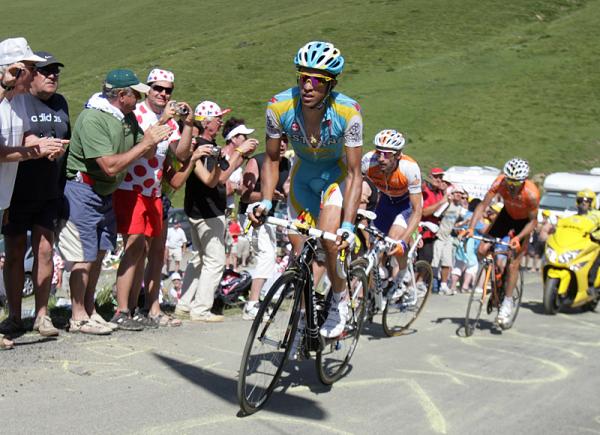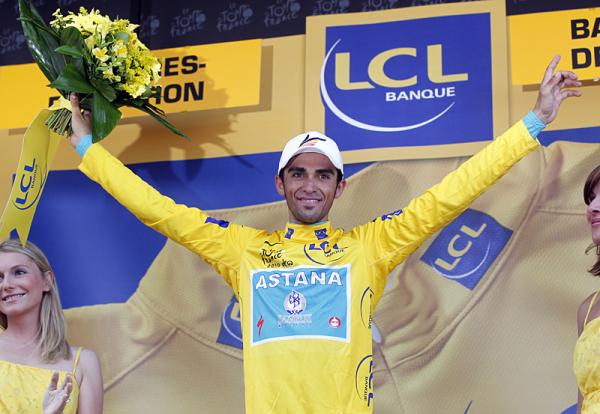Contador defends his attack on the Balès
Spaniard admits he can understand why Schleck is disappointed


At the 2003 Tour the question everyone was asking after a key stage in the Pyrenees was, "Did he wait or didn't he?" Seven years on, after another equally crucial stage in the Pyrenees, the question that was repeatedly directed at new race leader Alberto Contador was, "Should you have waited?"
Pressed in all kinds of different of ways about whether he should have ceased his attack once he had found out that Andy Schleck had been halted when he dropped his chain, the Spaniard stuck rigidly to the same line. It basically boiled down to insisting that he didn't immediately know what had happened to his main rival for the yellow jersey as they raced towards the summit of the Port de Balès, but whatever had happened was simply part of racing.
Soon after receiving his first yellow jersey of this year's race, Contador was quizzed about the incident on French TV. "We'd been marking each other and I was starting to think about attacking. I was told after I did attack that there had been an incident, but when I launched the attack I didn't have any idea about what the incident was," Contador said. "When I did find out what had happened we already had a big advantage and it was too late to do anything about it as we were all riding hard."
French TV diplomatically avoided asking about the jeers that could be heard when Contador received his yellow jersey on the Tour podium, but he was immediately asked about it in his press conference. "Some people understand what happened and others didn't understand. Those are the circumstances of racing and I knew there would be some debate about this incident. I attacked before he had a problem with his chain and was a long way ahead when I heard what had happened," Contador said.
"I realise that this is a delicate situation and that there is going to be a lot of debate about it. But as I said before, at the moment I attacked I didn't know what had happened to him, and when I found out I was already a long way ahead. On the Spa stage I told my teammates to stop without knowing at that time whether the riders who were in the lead would do the same. Then we had the stage on the pavé and there was another situation with a crash and the race did not stop there. And anyway I don't believe that 30 seconds at this point in the race is going to decide whether or not you win the Tour de France," he said.
Contador confessed that he could understand why Schleck was unhappy and why the Saxo Bank leader was talking of revenge, but stuck to his line. "I can understand him being disappointed with the way that the stage turned out for him. But when it happened I was on the attack and the most important thing for me is that I gained time today. For me it doesn't change anything. The goal is still Paris. I will keep focused on the race and trying to extend my advantage on several riders who are close to me in the standings."
When one reporter said that he must have seen that Schleck had a mechanical problem because he was behind the Luxembourger when it happened, Contador responded: "I wasn't aware exactly what had happened. I had my focus fixed very much on what I was doing. The other riders with me didn't know what was going on either. We were all focused on pushing as hard as we could, all taking turns to work."
Get The Leadout Newsletter
The latest race content, interviews, features, reviews and expert buying guides, direct to your inbox!
Contador is sure to face a bigger test from the enraged Schleck on the road to Pau tomorrow, but will perhaps take consolation from the thoughts of some respected Tour veterans. Asked for their opinion on the incident, Laurent Jalabert, Bernard Thévenet and Bernard Hinault all described Schleck's incident as an inescapable part of racing and said they were looking ahead to see how Contador and Schleck will respond.
What do you think about the Andy Schleck mechanical? Should his GC rivals have waited or were they in the right to attack? Weigh in on the Cyclingnews Forum.
Peter Cossins has written about professional cycling since 1993 and is a contributing editor to Procycling. He is the author of The Monuments: The Grit and the Glory of Cycling's Greatest One-Day Races (Bloomsbury, March 2014) and has translated Christophe Bassons' autobiography, A Clean Break (Bloomsbury, July 2014).